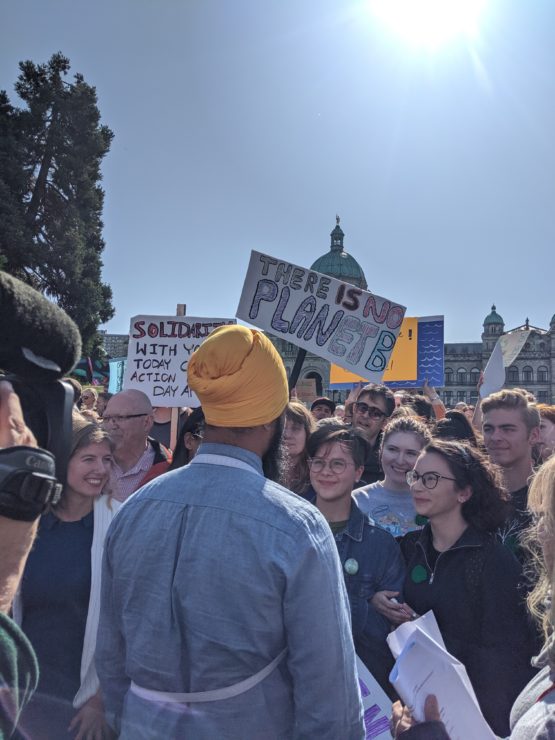Climate Strike Canada demands remain unmet by any federal party

Amid the 20 000 people marching in the Global Climate Strike on Sep. 27, Jagmeet Singh made national headlines. He took selfies and shook hands alongside several NDP candidates for local ridings, a world away from the Indigenous peoples leading the march and young organizers shouting in the streets for environmental action. At a glance, this part of the march more closely resembled a campaign event than a global call to action.
Climate Strike Canada demands legislation that will reduce our net greenhouse gas emissions to 75 per cent below 2005 levels by 2030. But despite that nearly all of the federal party leaders attended Global Climate Strikes across Canada, none of them have proposed policies that would meet these demands. However, all of these candidates garnered the attention of news outlets and protesters as they made their way through strike crowds.
Climate Strike Canada has seven cornerstone demands, which they feel will lead to climate justice. These demands include the implementation of the United Nations Declaration on the Rights of Indigenous Peoples, monetary support for those displaced by climate change and affected by climate disasters, the implementation of a “just transition” to renewable resources and jobs for workers in non-renewable resource industries, codification of environmental rights into law, the protection of at-risk species and habitats, and a moratorium on new fossil fuel projects or subsidies.
Now, let’s take a look at what federal parties are proposing in terms of emissions targets. The Liberals have promised to strive for net-zero emissions by 2050. The NDP have not specifically addressed emissions targets in their platform promises, but have said they would implement various other measures — including reliance on net carbon-free electricity by 2050.
The Green Party has portrayed itself as a reliable source of climate action, but even so, the Greens promise of 60 per cent reduction by 2030 falls 15 per cent short of what Climate Strike Canada says is necessary. The Green party, like the Liberals, is promising to reduce emissions to net-zero by 2050. The Conservative Party’s plan, which mainly includes reducing taxes and providing incentives for people to invest in clean energy, does not mention emission reductions specifically.
Despite the void between their promises and the demands of Climate Strike Canada, the Liberal, NDP, and Green leaders all marched with climate strikers last Friday — along with several local candidates in Victoria. They seemed to forget that a climate strike is a demand for them to actually do something, not to show up, wave, and take advantage of the free publicity.
As of writing, Canada has not yet met our Paris Agreement goals to reduce greenhouse gas emissions by 30 per cent, and some analysts have said that Trudeau’s carbon tax is capped too low in order to reach the 30 per cent goal by 2030. Climate Action Tracker states that our country’s efforts are “insufficient,” and are not consistent with the Paris Agreement’s required limit of keeping warming below 1.5 degrees celsius above pre- industrial levels. Anything above this number, the Intergovernmental Panel on Climate Change warns, would mean severe environmental consequences.
Our politicians are talking the talk with little hope of following through at a rate that would allow them to properly walk the walk, and our country — and climate — is already feeling the consequences.
“Political candidates cannot be considered rational or legitimate leaders unless they have a science-based plan to protect future generations,” Rebecca Hamilton, a co-spokesperson for Climate Strike Canada, said in a press release. “The future of our generation cannot be used as a bargaining chip or a publicity stunt.”
So the next time you see a candidate doing more canvassing than protesting at a strike for social issues, don’t take a selfie with them. Instead, remind them that it is their government, their platform, and their policies being protested. Remind them that their place is not in the streets with the masses, but in parliament enacting change.







